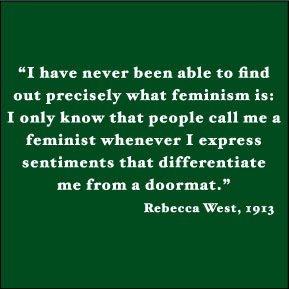Jennifer Popa
Dr. Heyne
ENGL 601
2 April 2012
Reading Response: Feminism
I remember in my first composition class in college, the word “feminism” came up and despite being a class predominantly filled with young women there was a hesitancy to identify oneself as a feminist. The instructor/ graduate TA was a PhD student of American studies, and she suggested we define feminism. The typical definitions arose along with some laughter regarding bra burning. It’s interesting how something which seems to have sprung from a desire to empower what was perceived as the weaker sex, is often regarded as a dirty word in contemporary circles. Why is the power behind this word so problematic? The general wave of definitions seemed to come from the vein of man hating, or that this was a collective group that not only valued their sex, but saw it as superior. Still on a fundamental level the argument for equality was reduced to the stereotype of an aggressive woman demanding something for herself.
At the time my instructor suggested we consider the term to mean “female pride.” And she wondered how that might change our conversation. Is it that simple though? Is it simply female pride? I think about “pride” with regard to gay pride weekend in Seattle. Admittedly Seattle is a large city with a significant gay population, and yet it’s hard not to see the population as empowered when they’re practicing/ demonstrating their culture in the form of a parade. So why all the fear? What specifically is to be feared if a person self-identifies as a feminist? Or with a group that is perceived to be on the peripheral? Is it a fear of any group with the power to transform our current state of society? I wonder if this fear also stems from the question of responsibility. There’s often a careful handling of material wherein oneself is a participant. The reality is we all partake in a form of oppression, suppression and repression with regard to a person’s sex whether we’re consciously aware of this role or not. So when an individual is able to articulate their victimization and ask for equality, perhaps it is a defense mechanism or for the sake of self preservation that they reject it. I think this is one reason why feminism is a useful angle when reading a text. The reader is asked to question the narration, the roles of female characters and the stereotypes that exist, and also to evaluate the attitude of other characters in relation to the female character. Naturally when evaluating this, there’s a distancing because thinking about these voices offers the reader a chance to look through the window and hopefully not implicate themselves. Instead they can review the oppression through the lens of a fictionally dominant group. Certainly, we are better able to understand ourselves, our impressions of the text reflect back who we are as readers, but there’s less an opportunity to feel victimized by the victimized.


No comments:
Post a Comment